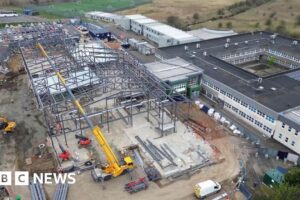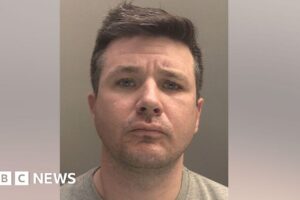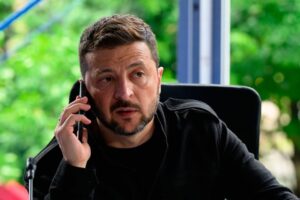
Vasylivka is a small town in Ukraine — many of its inhabitants fled the terror of the Russian occupiers. Under the leadership of the mayor, Vasylivka lives on in exile: a lesson in Ukraine’s will to persevere.
Shortly after half past seven on a winter Monday morning, another half-hour air raid has just ended in the city of Zaporizhzhia. Mayor of Vasylivka Serhii Kaliman enters the city council offices. The burly 51-year-old — balding head, full beard, olive-green jumper and black jeans — greets everyone who has already arrived, hugging some of them. One by one, more employees arrive, and soon the desks are full.
At eight o’clock, Kaliman calls everyone into the meeting room. A member of staff distributes coffee and herbal tea. The mayor explains what is on the agenda for the coming week. Later in the morning, there will be a commemoration of fallen soldiers and showing respect to those still fighting. The commission for the support of families of fallen soldiers is also meeting this week; there are also some school and youth events on the programme.
Occupied by Russia
Kaliman thanks everyone present. He speaks loudly and emphatically, and yet he sounds warm-hearted. “Thank you for being here,” he says. “Thank you for being here.” The room is silent for a moment, as if everyone is pausing and remembering what they have been through together.
The city council meeting here is no ordinary one. It is the council of a town that lives without a town: Vasylivka has been occupied by Russia since the beginning of March 2022. It is a small city that, together with its surrounding communities, was once home to 22,000 inhabitants. Around four-fifths of the former inhabitants chose to move to the territory of free Ukraine rather than live under the occupation regime. Among them were the legally elected mayor, Serhii Kaliman, and most of the city council and public sector employees.
Most of the Vasylivka residents now live in the city of Zaporizhzhia, just 60 kilometres to the north, where they have made a fresh start. But they don’t just stick together as a community — they are not a city that exists only symbolically. The people of Vasylivka have reorganised their town with everything that is possible without being in the town itself. Vasylivka in temporary exile has a regular budget and financial administration, educational institutions, a medical service as well as social services, contacts for legal and career advice, a centre for the distribution of relief supplies, its own police unit, sports clubs, a scout group, and a lively cultural life.
The Ukrainian state offers a good legal framework for this. Exiled city or municipal administrations can operate like any other. For example, companies can register with them and pay taxes to them. However, not all such cities and municipalities make use of these opportunities.
A new beginning in tragedy
The story of Vasylivka as a town without a town is not unique in Ukraine. But hardly any other such town functions as well as this one does, making so many efforts not to fall apart despite war, occupation, and flight. It’s a story of people who find the strength for a new beginning in the midst of an almost indescribable tragedy and profound hopelessness — a story that also contains plenty of typically Ukrainian elements.
Just how tragic the history of Vasylivka has been over the past three years could be seen that morning in a large hall in the centre of Zaporizhzhia, 20 metres underground. It’s a huge cellar, converted into a bunker for events.
Around 300 people have come to the memorial service for the fallen soldiers from Vasylivka. At the beginning, during a minute’s silence, a clock hand sounds with sharp, relentlessly regular beats. Then those gathered sing the national anthem. Afterwards, a video on a large screen shows scenes from the beginning of the war in Vasylivka.
On this day, the mayor awards medals to fallen soldiers and those still fighting, on behalf of the Ukrainian state. He says, “Almost none of us could believe that this war was coming, we thought we were living in the 21st century.” Kaliman speaks of the shock of the first days of the war, the resistance against the occupiers, the hundreds of thousands of refugees who came through Vasylivka. He says that he personally knew most of the fallen who were honoured on this day.
At some point, he falters, takes a deep breath, and looks down at the floor. You realise how close he is to what he’s saying — and that he hasn’t thought out the words beforehand.
Commemoration of the fallen
A young man reads out the names of those killed; their photos appear on the large screen, along with a few biographical sentences. The relatives come forward. Kaliman, his face marked by restrained sorrow, says a few personal words about each of them, recalling their encounters. The widows, siblings, and children weep. Some hold their hands to their faces in despair. The pain is almost unbearable. Kaliman manages to give the relatives the feeling that they are not lost and forgotten in the community of their hometown, beyond the metal tribute on velvet that he hands over.
The history of Vasylivka after 24 February 2022 — the town without a town — is hard to imagine without the mayor, Serhii Kaliman. He waves his hand dismissively when he hears this. He then talks about his team and the special solidarity of the people of Vasylivka. But they say that without him, they would probably be scattered to the winds.
Kaliman comes from Rozdol, a small village near Vasylivka. He studied veterinary medicine but has worked as a farmer since the age of 24. Together with his brother, he founded a farm in Vasylivka in 1995. Initially, they grew fruit and vegetables on 38 hectares of leased land. Two and a half decades later, they had 8,000 hectares and were one of the largest agricultural producers in south-eastern Ukraine. “We achieved this with our own hands,” says Kaliman proudly. “Without corruption, taxes paid on time, profits reinvested.”
He pulls out his mobile phone and scrolls through the photo gallery. He shows apple orchards, fields of peppers and aubergines, harvesting machines. He raves about the flavour of his cherries. At some point, he swallows at the sight of the photos, turns his head away, and puts the phone aside.
“They trusted me”
Kaliman was never drawn to big politics. But when residents in Vasylivka asked him one day if he would like to become mayor, he agreed. “I was approached by young people who wanted to change things,” says Kaliman. “They trusted me. They thought I was someone who wasn’t corrupt. And I thought: yes, I want to change something together with them.”
In autumn 2020, Kaliman, as an independent candidate, was elected mayor of Vasylivka with a large majority. He soon cleaned up corruption and mismanagement. He cancelled unfavourable rental and lease agreements for the city, streamlined the administration, and abolished the mayor’s official car. He pushed ahead with projects for the city: the construction of a sewage treatment plant, the modernisation of the town hospital, the creation of a city park.
His dream was to build an IT and technology park in Vasylivka and turn the place into a model ecological centre. Then came 24 February 2022. “I was still convinced the night before that there would be no war,” recalls Kaliman.
For him, he says, escaping was never an option. On the morning of 24 February, he went to the mayor’s office as usual. There, together with the regular armed forces, they organised the defence of the city and put together a crisis team. They organised evacuations and provided refugees with food. Kaliman posted a video on the city’s Facebook page and said, “We are defending ourselves. Together we will get through this. I am with you, we are together. Everything will be fine. God with us.”
Before the Great War, Vasylivka was the most important transport hub in the south-east of Ukraine. After 24 February 2022, it became a passage for war refugees from besieged and occupied cities such as Mariupol and Melitopol. From 4 March 2022, Russian troops also occupied Vasylivka after heavy fighting. Ten kilometres north of the city, at a bridge over a wide valley, the front came to a halt. It remains there to this day.
Terror by the occupying forces
The hardest days of Kaliman’s life began. The occupiers interrogated him and threatened to shoot him if he refused to collaborate. He posted Facebook videos every day, talking about the current situation, saying each time, “We are together. Everything will be fine. God with us.” If you ask the people of Vasylivka today, they say these videos were a daily ray of hope back then, in the first weeks of the war — a message of not being abandoned, as they sat in cold, dark cellars and heard explosions above them.
Kaliman demanded that the Russian commander in the city allow evacuations. The commander eventually relented — though Kaliman still doesn’t know why. Over the next seven weeks, nearly a million internally displaced persons passed through Vasylivka on their way to free Ukrainian territory, including the majority of the town’s own residents.
One day, when Kaliman refused to remove Ukrainian and European flags from the town hall and offices, Russian soldiers led him away to the commandant’s office — and then to the courtyard for execution. He didn’t ask to spare his life. They held a gun barrel to his temple, shot, and he fainted. It was a mock execution. Kaliman’s lips tremble when he talks about it, and he struggles to suppress his tears. He says, “I knew then that I had to leave if I wanted to survive.”
On 17 April 2022, when almost all of his employees had already been evacuated, Kaliman also left the city under a pretext, alone in his car, with just a rucksack. At the checkpoint, the Russian soldiers let him pass. He drove through the “grey zone” — the no-man’s land between the fronts — into free Ukraine. What remained behind in Vasylivka was his proud agricultural business, which once employed almost 300 people. His life’s work.
A city doesn’t give up
When Serhii Kaliman talks about his story, he speaks only briefly about the loss of his business. He says that the respect of the people in his community is more important to him — and the feeling of not being a traitor. He talks more about his colleagues in the city council: how they risked their lives, how they refused to become collaborators, how they also left and lost everything themselves.
There is Oksana Mynakova, now Kaliman’s deputy. She was a headmistress in a village that is now in ruins. The school was her big project, her baby. She shows a video on her phone — lovingly decorated classrooms, happy and dancing children, sports competitions. Then the bomb and missile strikes hit the building in spring 2022. In the end, everything is in ruins. As she looks at the pictures, tears run down her face.
There is Tamara Komlyk. She heads the education department in the city council of Vasylivka. When the occupiers came to the city, they humiliated Komlyk daily with demands to organise heroic and memorial ceremonies with schoolchildren in their honour. She resisted until she was put on a list of suspects who were forbidden to leave the city. She still managed to escape. Under her leadership, the schools in exile were resurrected.
There is Anastasiia Kuznetsova. She was 18 years old when the full-scale began. She used a smartphone to film the mayor’s video messages and the evacuations of internally displaced persons every day, and posted everything on Facebook. Today, she works in the community development team in Vasylivka.
Help for all
One afternoon in late winter, Anastasiia organised the mayor’s weekly telephone consultation. Residents could sign up and wait for a call. Most of the appeals are about family, medical, and social matters. Kaliman sits in his small office in the city council building, patiently explaining things, sharing contacts, telephone numbers, and office hours. In between, his deputy places a pile of documents on his desk to sign. At some point, a soldier on leave comes in unexpectedly, and Kaliman gives him a long, warm hug.
He then drives to a former vocational school on the other side of the city. A dozen men and women sit behind tables; people come in, present their IDs, and are added to the list. Some pick up a box containing flour, sugar, pasta, oil, tinned food, some sweets, and toiletries. Others go to the tables. There is help with finding work and accommodation, legal advice, offers of further training, and a child and family service. A doctor with a blood pressure monitor and a stethoscope sits nearby, ready to take blood pressure or provide basic medical assistance.
The building houses the community centre of Vasylivka. Tons of food and hygiene products are stored in the large hall on the ground floor. Residents in need receive a quota every month. There are also classrooms and a gym. Two rooms for a medical service are currently being extended. Vasylivka is also very proud of its Inclusive Resource Centre, a social service for children with disabilities, supported by specialised staff. Art therapy, for example, is held regularly for the children in the community centre.
Iryna Shovkoplias has come here that day because she needs legal advice. The 49-year-old was a postal worker in Vasylivka, her husband a retired professional soldier. The couple had spent almost their entire lives in the city. In February 2022, Iryna’s husband and two sons immediately volunteered to join the Ukrainian armed forces. She herself stayed in the town. At first, she didn’t want to leave because she didn’t know where to go, but later there were no more options. Finally, in the late summer of 2024, she dared to flee — travelling through occupied southern Ukraine, Russia, and Belarus. From Vasylivka to Zaporizhzhia, normally a 45-minute drive, became a detour of over 3,000 kilometres. She had only her passport and a few documents with her.
Tears stream down her face again and again as she tells her story. She enlisted in the Ukrainian army when she arrived in Zaporizhzhia. She shows a photo of herself in uniform and with an assault rifle. “The war tore my family apart and took everything from me,” she says, crying. “My husband and sons are fighting. I would have been ashamed not to do the same.”
“The last checkpoint was the worst”
A group of female teachers are sitting in a room on the second floor. Together with a colleague, psychologist Tetiana Mostova is giving a lecture on how to talk to pupils about everyday life during the war — about the daily bombardments with rockets, guided bombs and drones, about what they experienced during the occupation, about the loss of loved ones. “The young people learn how to cope with stress or get a grip on insomnia,” says Tetiana Mostova. “For the younger ones, we organise creative courses where they can express their feelings.”
Tetiana Mostova is one of the people from Vasylivka who have reorganised the school system in exile. Lessons now consist of a mixture of face-to-face, online, and self-directed digital learning, as some of the pupils are scattered across Ukraine and abroad. Missed lessons can be watched on video, and there are parent and student consultations online.
In January 2022, Tetiana Mostova had just taken over the management of a school in Vasylivka. Then came the full-scale war. She and her husband sat in the cellar for days on end. When she could take it no longer, she signed up with the mayor to volunteer for the crisis team. She provided residents and refugees with medication.
At the end of April 2022, she fled with her husband in a small convoy of cars. It was not clear whether they would survive; they had to pass through 31 Russian checkpoints. “Each time, the soldiers stole something — food, a torch,” says Tetiana Mostova. “The last checkpoint was the worst, because they provoked my husband and offered him to fight in the Russian army.”
Tetiana Mostova says that the occupation was a very drastic experience, difficult for outsiders to understand — the arbitrariness, the fear, the humiliation. She is grateful for the community of her town, which was organised in exile, and she is very grateful to the mayor. “You can come to him with ideas, with a project, and he is open and helps to implement it,” she says. “He can motivate people. We trust him because we feel that he believes in what he says, and because he lives what he says.”
Serhii Kaliman would probably have fought in the army himself back in 2014, but when he was 28 years old, he had a lung removed due to cancer and has been unfit for military service ever since. When he arrived in Zaporizhzhia from the occupation regime, he suffered a life-threatening physical collapse and was hospitalised. The doctors then sent him on a course of treatment lasting several weeks.
Start at zero
When Serhii returned from the hospital, he immediately gathered his staff and said that Vasylivka had to reorganise itself. They registered all the evacuated residents, reconstructed data and documents, applied for state aid and established contacts with aid organisations, rebuilt their network of counselling and social services, and set up their community centre. At some point, they were given office space, which they renovated. “We had nothing in spring 2022. We started from scratch,” says Kaliman.
He himself also started from scratch. He had no money set aside in bank accounts and had no flat. He doesn’t complain about it. Now he’s just the mayor. He still uses his private car and still pays for petrol for business trips out of his own pocket. He is usually on the road from morning to night — attending meetings in the city council, answering questions from citizens during office hours, visiting youth groups, or talking to foundations and civil organisations to campaign for support for his city in exile. He is present when school classes come together and speaks to the young people. Sometimes he stops in the middle of traffic in Zaporizhzhia and jumps out of the car to greet and hug old acquaintances.
Together with companies — including many that pay their taxes in exiled Vasylivka — he and some members of the city council have drawn up a reconstruction plan for the period after the end of the Russian occupation. These are not declarations of intent, but detailed plans — for example, for the reconstruction of the destroyed hospital in Vasylivka. The city is ready to return to its place and start again immediately.
One evening in a restaurant in Zaporizhzhia, Kaliman is drinking herbal tea, as he usually does. A young waitress who works there — and also comes from Vasylivka — sees him and gives him a long hug, like a father. “We stick together,” says Kaliman later. “Most people here in the city don’t understand what occupation is like. What it’s like to lose your house and your hometown. We’re the so-called migrants here. Strangers, actually.”
“You Germans were — and still are — one of the most developed countries in the world. And yet, you started a war. Why? Russia is the largest country on Earth, rich in every imaginable natural resource. Why do they need our country too? I’m a simple man. I’ve spent half my life working the land as a farmer. I want to understand. But I can’t. Why?”
“I want to show you something”
The next day, we drive to Prymorske, a village south of Zaporizhzhia. “I want to show you something,” says Kaliman. We drive along the Ukrainian north–south motorway M18, which runs from Kharkiv to Simferopol in Crimea. Without the war, it would now be 50 kilometres to Vasylivka — half an hour. Kaliman remains silent during the journey. At some point, he says quietly to himself, “The way home. Home. Home.” Then he says a prayer.
The sun is shining, there are only a few clouds in the sky, and hardly any wind. Perfect weather for kamikaze drones — the frontline is just 15 kilometres away. But for some reason, the Russians are quiet at the moment, according to the military. The journey takes us past farmhouses destroyed by artillery and rockets. In between, people still live here, working in gardens and yards around houses that are halfway intact.
Kaliman stops on a hill at the end of a country lane in Prymorske. You have a sweeping view of the huge, empty Kakhovka reservoir, once one of the largest reservoirs in Europe before the Russians blew up the dam. Plants now grow in it, and it stretches out before you like a gigantic green sea.
Kaliman points into the distance, to the south. A faint, elevated strip of land rises from the reservoir, blurred by haze. “That’s where our municipality begins,” he says. “From there, it’s not far to Vasylivka.”
He stands still, gazing into the distance — towards home.
The material is prepared by
Founder of Ukraїner:
Bogdan Logvynenko
Editor-in-Chief of Ukraїner International:
Anastasiia Marushevska
Coordinator of Ukraïner International:
Yulia Kozyriatska
Content manager:
Kateryna Minkina
Coordinator of content managers:
Kateryna Yuzefyk





